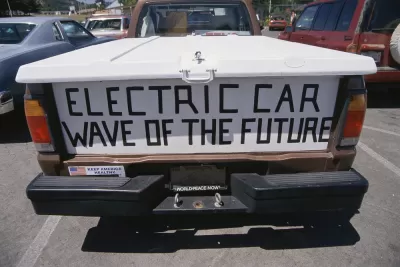It’s time to harness technology for cleaner, healthier, and safer cities.

This article calls for the elimination of vehicular exhaust from urban centers within the next ten years. It draws an analogy between tolerating polluted air in our city streets and smoking on an airplane, which was finally banned in the year 2000.
The writers state: "With the ever-improving performance of electric-powered vehicles - from autonomous shuttles to new forms of micromobility - and a growing realization that quality of life is not all about moving traffic, there is no reason that we can’t have city centers that are cleaner, healthier and safer than what we have today."
The article discusses other sources of pollution, including particulate matter, and explains that electrically powered vehicles still have better environmental performance even when their power source is derived from fossil fuels. Finally, the article challenges North American cities to catch up with European cities in taking on bold proposals to limit fossil fuel engines and create environments that better accommodate pedestrians, bikes and other clean modes of transportation.
FULL STORY: Exhaust-free city centers by 2030!

Maui's Vacation Rental Debate Turns Ugly
Verbal attacks, misinformation campaigns and fistfights plague a high-stakes debate to convert thousands of vacation rentals into long-term housing.

Planetizen Federal Action Tracker
A weekly monitor of how Trump’s orders and actions are impacting planners and planning in America.

In Urban Planning, AI Prompting Could be the New Design Thinking
Creativity has long been key to great urban design. What if we see AI as our new creative partner?

King County Supportive Housing Program Offers Hope for Unhoused Residents
The county is taking a ‘Housing First’ approach that prioritizes getting people into housing, then offering wraparound supportive services.

Researchers Use AI to Get Clearer Picture of US Housing
Analysts are using artificial intelligence to supercharge their research by allowing them to comb through data faster. Though these AI tools can be error prone, they save time and housing researchers are optimistic about the future.

Making Shared Micromobility More Inclusive
Cities and shared mobility system operators can do more to include people with disabilities in planning and operations, per a new report.
Urban Design for Planners 1: Software Tools
This six-course series explores essential urban design concepts using open source software and equips planners with the tools they need to participate fully in the urban design process.
Planning for Universal Design
Learn the tools for implementing Universal Design in planning regulations.
planning NEXT
Appalachian Highlands Housing Partners
Mpact (founded as Rail~Volution)
City of Camden Redevelopment Agency
City of Astoria
City of Portland
City of Laramie





























